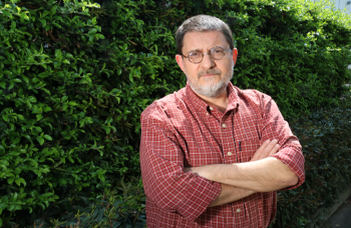"I did not chose this way, It itself has come towards me."

Interviewer: What is this recognition all about?
György Könczei: Above all, it’s about the “talent programmes” those have been going on for a long-time; obstinate talent programmes. In fact, the entire Disability Studies Doctoral Workshop should have been given the prize (my own credit was only to come up with the original idea). Because the Workshop is a growing community of approx. a dozen scholars that’s been supporting doctoral students and candidates. This support is realized in doing research and writing doctoral theses in the field of Disability Studies for 7-8 years. The Workshop is ultimately nothing more than the practice of selfless support. Here participants do support each other, and from the heads (currently: Ilona Hernádi, PhD and me; earlier with Roland Keszi, PhD) they get close and continuous attention.
I: Would you please summarise your recent research objectives and research profile?
Gy K: Well, as far as the Institute is concerned, everyone has their own personal, individual research interest. I've also had one for years, which seemed to be the reverse of an older hypothesis: from Taigetus to equal opportunities. I proposed the DSDW a common research activity several years ago, in order to analyse a scientific hypothesis. Finally, we won a research fund from OTKA (i.e. the National Scientific Research Foundation) with the From Equality to Taigetus? program (September 2014 - May 2017 K111917).
L’Harmattan Publishing Co. published the initial, not yet empirical findings of our research last year. We examined the life prospects of unborn disabled children and the role of their mothers; the possibilities of disabled children, being adopted into families and growing up; and opportunities for persons with intellectual disabilities to become parents in Hungarian society.
I: How do you see the present period?
Gy K: There was a period from 2005-2006 when the focus was on the dissemination of knowledge (open universities, Disability History Touring Exhibit, etc.). Now the direction is different. Since then, the last few years have become more internally focused. It seems to be more important to concentrate on the Workshop and the development of the colleagues in the Institute.
However, you can not do everything at once. Establishing and introducing a new scientific field (i.e. Disability Studies) in the country, establishing and providing the organisational background, and at the same time publishing and maintaining international relations, as well as monitoring the development of the colleagues – all this has to be done.
I: Any further plans?
Gy K: We might continue our previous participative OTKA research, but now it might be better to stop for the time being and think about the results. While the past two decades was more of a one-way rush toward options, now it seems more worthwhile to wait.
For all the research projects, the Workshop and its members the words of the Transylvanian poet László Király ring true:
"Why did you choose this path, Wanderer? I did not chose it, it came towards me. Do you know that it is an endless road? I know, but I am not impatient.”
That is, somehow we choose each other and our paths also choose us. And the Workshop is constantly working. Its members, self-developing practices and research ideas are in part chosen in the way as the poem describes, and in part by the common activities and work done in the Workshop.
I: Thank you for the interview.

